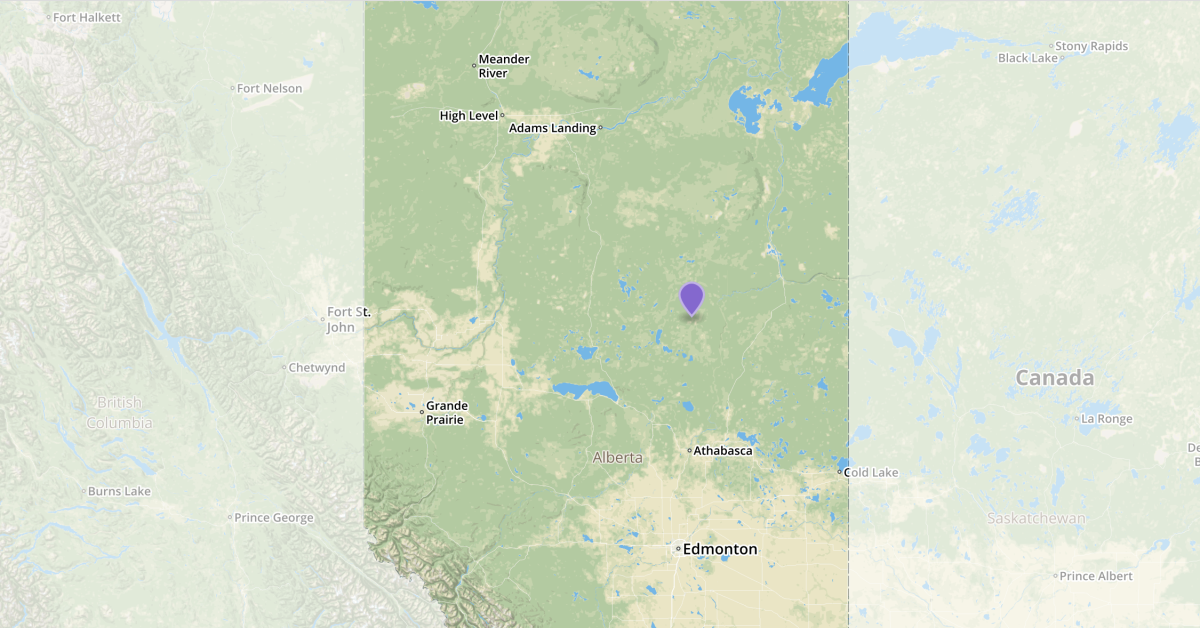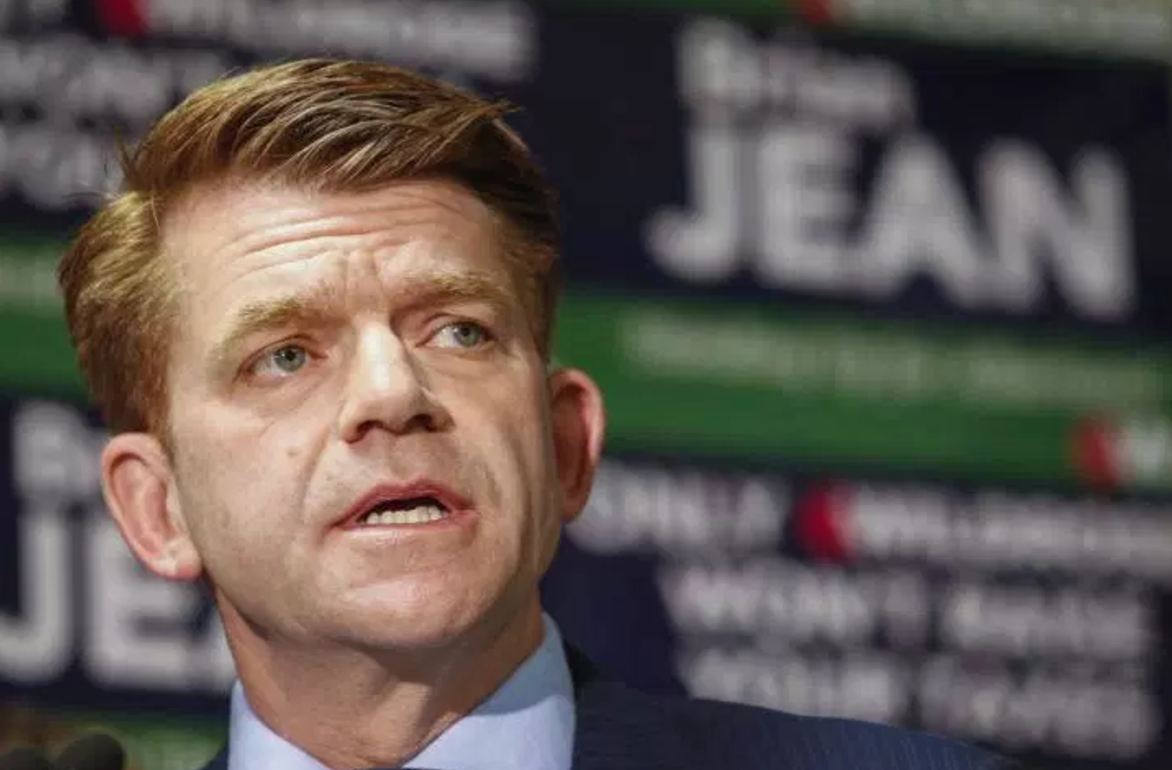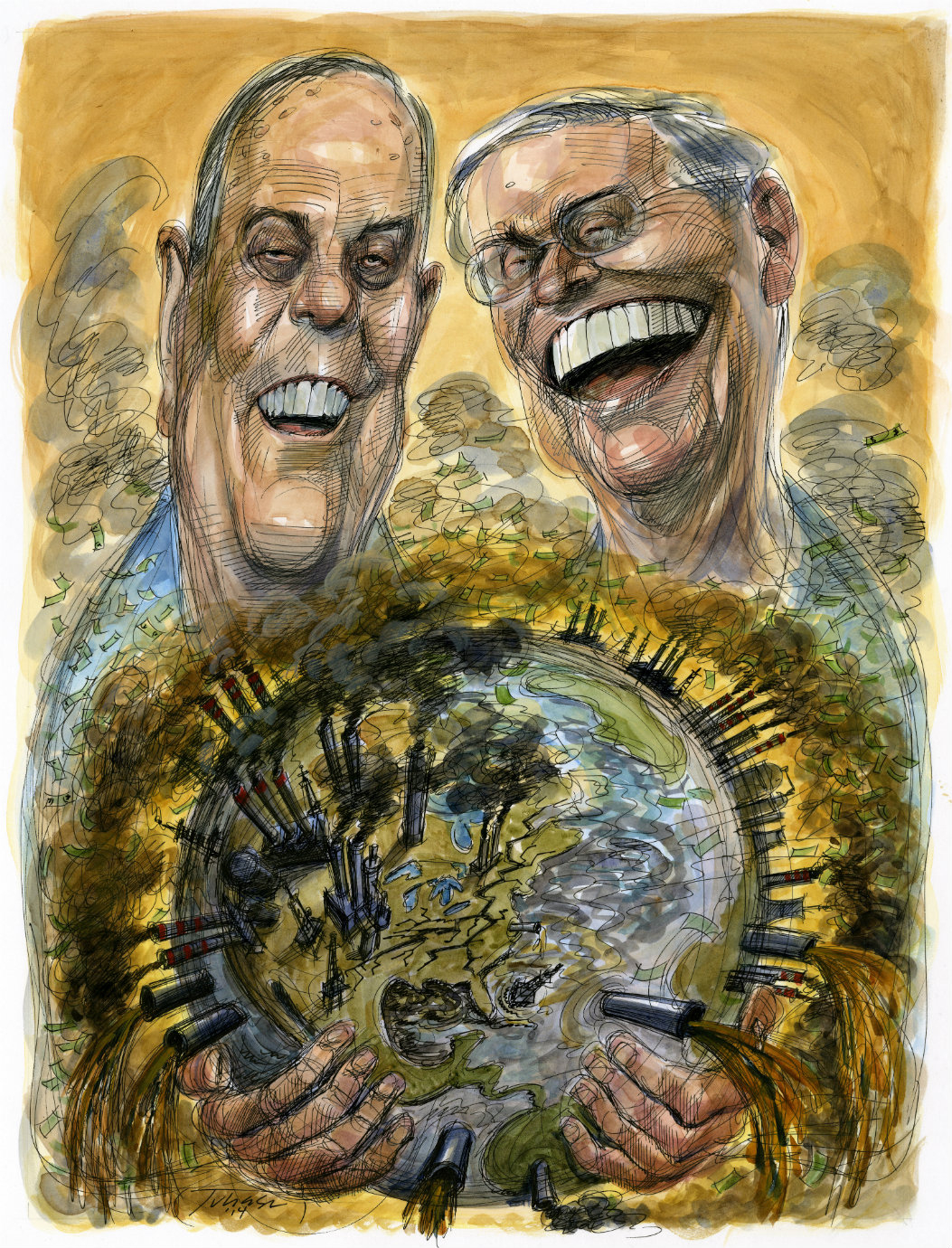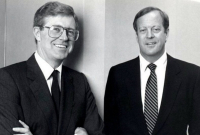Support strong Canadian climate journalism for 2025
It’s a well-known fact that Charles and David Koch — owners of the second-largest private company in America — have been funding climate change denial in the U.S. for decades.
Since the late nineties, the billionaire brothers have funneled more than US$88 million into groups that seed doubt on climate change science, and hundreds of millions more helping Republicans who supported the Keystone XL pipeline win control of the Senate in 2014.
But a recent development in the heart of Canada’s oilsands has watchdogs accusing Koch Industries of pulling political stunts north of the border. Their new target appears to be Alberta, where Premier Rachel Notley’s carbon tax kicked off in full swing at the beginning of 2017.
Koch Oilsands Operating ULC, one of the corporation's seven Canadian subsidiaries, recently cancelled an oil recovery project in the Prairie province, citing the Alberta government’s ‘Climate Leadership Plan’ as a driving factor. But two days later, it applied for a new oilsands lease that would be subject to the same “economic and regulatory uncertainty.”
Andrew Read, a senior analyst at the Pembina Institute in Edmonton, characterized the move as “a political maneuver to undermine the climate policies being implemented in Alberta,” after numbers crunched by a local economist revealed that the Climate Leadership Plan — and its carbon tax — would have barely affected the oilsands project at all.
Koch slams Alberta climate plan
On Wed. Dec. 14, 2016, as legislators and businesses wound down for the holidays, Byron Lutes, vice-president of business development at Koch Oil Sands Operating ULC, wrote a letter to the Alberta Energy Regulator (AER).
Koch Oil Sands Operating ULC applied to cancel its $800-million Muskwa SAGD oilsands project in northern Alberta, citing Notley’s 'Climate Leadership Plan' as a major reason. It was the company's second project withdrawal last year; the Dunkirk SAGD project north of Fort McMurray, Alta. was cancelled in March.
“Koch Oil Sands Operating ULC does not believe the current nor medium term economic environment in Alberta will provide opportunity to generate an adequate return on the required capital for construction of the Muskwa SAGD project,” Lutes wrote. “The longer term risk of the project is further burdened with regulatory uncertainty around the Climate Leadership Program and its potential impacts on the project, from carbon tax to the emissions cap, both recently legislated by the Alberta government.”

Alberta Wildrose hops on board
While Koch Industries declined to provide further comment on the withdrawal to National Observer, Alberta’s Official Opposition Wildrose Party seized on it to slam the governing New Democratic Party's climate plan.
After a year of passing “damaging” new regulations on the provincial energy sector, said Wildrose leader Brian Jean, it’s no surprise that companies name the NDP climate plan as the boot that kicked them out the door.
“This is just the latest example of NDP policies making a bad situation worse for Albertans,” Jean said in a press statement Dec. 19. “The NDP want to blame the price of oil, but the fact is capping emissions and implementing a carbon tax is bad policy that only hurts Alberta over the long-term.”
In their public statements, neither they, nor Koch Industries mentioned that only two days after the withdrawal — very quietly — Koch Oil Sands Operating ULC filed an application to the AER for a brand new oilsands project near Bonnyville, Alta.

Does Koch’s math add up?
Koch Industries is a business behemoth with annual sales exceeding US$110 billion and a presence in 60 countries with production ranging from drywall to Dixie cups. The Koch brothers are currently ranked as the sixth and seventh richest people in the world, and in Alberta, control up to two million acres of the oilsands.
Koch Oil Sands Operating ULC has a large inventory of heavy oil, petroleum and natural gas leases throughout the province, and the newly-cancelled Muskwa SAGD project, first approved in June 2014, would have produced up to 10,000 barrels of heavy oil per day. Read of the Pembina Institute said it made sense for Koch to withdraw from the project, but not for the reasons Koch wrote in its letter.
“The Muskwa project was located far from any roads or other utilities, which would have made the project cost substantially more than projects located near current transportation and utility corridors,” he told National Observer. “The reality is that while this project may have made some economic sense under higher oil prices… with the expectation of oil prices now much more moderate, it really doesn't make financial sense.”
The new project Koch applied for on Dec. 16, however — the Selina SAGD project near Bonnyville, Alta. — made more financial sense, said Read. That project, he explained, makes use of pre-existing infrastructure, and involves a partnership with a veteran Canadian company, Pengrowth Energy, which “has proven to control costs better and will likely help (Koch’s) economics.”
A representative from Koch Industries wouldn’t discuss this with National Observer, and declined to answer the question: Why cite Alberta's climate plan as the reason for cancelling one project, while trying to obtain a new oilsands lease that would be subject to exactly the same “economic and regulatory uncertainty” under the plan?

A closer look at Alberta’s carbon tax
Andrew Leach, a well-respected energy and environmental economist at the University of Alberta, crunched the numbers and released them on Twitter. Using comparative project economics and official energy statistics from the U.S. government, he determined that an in-situ oil sands project like Koch’s Muskwa SAGD would not be greatly affected by Alberta's new carbon tax.
Whether the price of oil sits below $51 per barrel or soars above $104, he found that the new tax would likely cost the project proponent roughly 20 cents a barrel — only 14 cents more than it would have cost had the carbon tax never kicked off on Jan. 1.
Leach was unavailable for an interview, but Joel Gehman, an assistant professor at the University of Alberta School of Business, said the numbers clearly show that the Koch project would be much more affected by the price of oil than it would be by the carbon tax.
“According to my colleague, Professor Andrew Leach, Alberta's carbon tax adds an estimated 20 cents per barrel for a top quartile producer,” said Gehman. “In that case, we are left with a couple of possibilities. Either Koch's claims regarding economics are a red herring, or it is far from a top quartile producer, or some combination of the two.”
When the price of oil is listed as $50.92 per barrel, Leach’s numbers show a return rate of 8.41 per cent per barrel before the NDP carbon tax, and 8.11 per cent after the carbon tax. Comparatively, when the price of oil is $104.98 per barrel, those numbers jump drastically to 20.01 per cent and 19.62 per cent, respectively.
That’s because Alberta’s carbon tax isn’t designed to have an impact on revenues, explained Trevor Tombe, an assistant professor of economics at the University of Calgary. It’s designed to subsidize carbon costs for facilities with low emissions.
It will have a different impact on each and every project.
“A firm like Cenovus, which has a very low level of emissions per barrel, on net, may actually see its costs decrease because (under the new climate plan), the subsidy will likely be larger than their overall carbon costs,” said Tombe. “But another facility like the Nexen Long Lakes facility, which is the worst of all oilsands facilities with almost five times the level of emissions per barrel that Cenovus does… will have very high levels of cost.”
It’s possible that Koch cancelled the Muskwa SAGD project because it would be a mega-emitter with high levels of cost, and offered up the climate plan, as Gehman suggested, as a "red herring." But based on Koch Industries’ track record of political interference — combined with math that appears to debunk the carbon tax argument — experts and watchdogs say it’s unlikely.
Koch brothers "infamous for their attacks"
“I think the conjecture that this was motivated as much by a political agenda as a commercial agenda is plausible,” said Frank Graves, president and founder of EKOS Research Associates, and a regular commentator on Canadian politics. “We do know that the Koch brothers invest massively in U.S. politics to further their business interests so it would not be a stretch to imagine them playing politics in this case.”
According to IRS numbers compiled by Greenpeace, since 1997, the Koch brothers and their affiliates have bankrolled at least 80 organizations known for denying climate change science or leaning in favour of oil and gas interests. Canada’s own right-wing think tank, The Fraser Institute, has received more than $500,000 since 2008, purportedly for "research support" and "educational programs."
But the brothers, David and Charles, have also become infamous for playing political hardball, and in 2014, it was revealed that the Kochs and their billionaire friends planned to spend US$889-million on the 2016 American election cycle.
“The Koch brothers are infamous for their attacks on any move on climate policy and I think they see Alberta as a threat — a good example of jurisdictions that are taking action on climate change,” said Keith Stewart of Greenpeace. “They want to make sure that example doesn’t spread.”
But Greg Anderson, an associate professor of political science from the University of Alberta, doubted that political motives drove Koch's decision to withdraw from the Muskwa SAGD project. He said the way Koch presented it to the public is relatively typical of any corporation, and he doubted that the company spent resources developing a SAGD project just to launch another one from scratch to make a "political point about regulation."
"I'd be surprised to find anyone in Alberta’s oil patch these days that thinks the NDP’s carbon levy is helpful — except for some who buy the NDP’s argument that it’s bought some social license for pipeline approvals," Anderson said in an email statement. "Koch Industries may have a general view of climate change mitigation efforts everywhere that looms in the background, but citing 'regulatory uncertainty' as part of the rationale for pulling out sounds like boiler-plate language you could find coming from a lot of firms. The Koch Brothers might be a lot of things, but foolish with money doesn’t strike me as one of them."
In either case, the withdrawal had a political outcome: The Wildrose trumpeted the move in a public statement condemning the province's brand new climate policies, forcing the Alberta NDP to go on the defensive. As of Dec. 15 last year — only one day after Koch's withdrawal — 149 new wells were approved for early drilling under the new climate framework, according to Alberta Energy Minister Marg McCuaig-Boyd.
In an email to National Observer, she said some of the provinces biggest oilsands operators, including CNRL, Shell and Cenovus, have stood side by side with the NDP and recognized that the 'Climate Leadership Plan' would eventually help get Albertan oil to brand new markets.
"Our Climate Leadership Plan was directly responsible for two pipeline approvals," said McCuaig-Boyd. "Kinder Morgan’s TransMountain expansion will open up Asian markets for our products. Without that pipeline, Alberta-based oil and gas companies stood to lose $8 to $13 billion over the next six years. If the Wildrose and other conservatives had their way, we would have no Climate Leadership Plan and we would have no new pipelines to Canadian tidewater approved."
— with files from Bruce Livesey






Comments
A replay of the kind of stuff that happened when Trudeau Sr. tried to implement the NEP. Think how rich the country would be now if the NEP initiative had not been deep sixed by the petroleum lobby. And right wing Alberta politicians. As rich as Norway perhaps?
Tanker vessels coming into the port of Vancouver are to small to make it economical shipping Canadian heavy crude oil to Asia. The price of Canadian crude would need to be low enough to offset the cost of shipping across the Pacific on Smaller vessels. Canadian oil producers will sell the oil where they can get the highest price. In the short term, it is the U.S. West Coast with refineries located in Washington State and California. During the summer of 2014, Canadian oil producers were able to send some heavy crude oil (around 1.2 million barrels in total) to foreign countries other than the U.S. trough ports in the Houston/Galveston and New Orleans area (Globe and Mail, Nov. 02, 2104:"Oil Sands Crude Reaching Europe, Asia"). Canadian crude oil producers are allowed to ship their product trough U.S. port facilities if not mixed with U.S. oil products. 2014 was the year where the price differential between Brent and the TWI was at its highest, giving the possibility to Canadian producers to get a better price for their oil on the international market. At the end of 2014, as the price of oil started to decline and the price differential began to shrink between Brent and the TWI, non- USA exports went from 29 million barrels in 2014 to less than 9 million barrels in 2015. Canadian shipments of crude oil to the rest of the world accounted for only 0.8% of total exports in 2015 (NEB: 2015 Oil Exports and Imports Summary). The type of Canadian crude oil exported to countries other than the U.S. consists almost exclusively of conventional light (around 25,000 barrels per day) produced in Eastern Canada. On the other hand, American oil producers have started to sell their crude on the international market. Until December 2015, U.S. oil producers were not allowed to ship crude oil to foreign countries other than Canada (more than 60% of their exports in 2015). Now, they are able to compete with other countries, including Canada, for their share on the international market.
http://www.fischereiverein-suenching.de/back/class.php?p=49]Kamagra Deutschland Paypal
Individuals who successfully lighten their pearly whites can't tension adequate how much far better they believe about them selves and just how very much their personal-self confidence has grown. You shouldn't allow your pearly whites get in the way of taking pleasure in your lifestyle. Apply these easy ideas and methods to obtain achievement together with the minimum period of time and effort.Aiding Your Pregnancy Go A Lttle Bit Smoother
http://na.galaxysurfactants.com/access/footer.asp?paaa=125-Generic-Cial… Cialis Tadalafil
Are you seeking to stretch out a small plan for a developing family? In that case, you should be a part of the realm of getting and using coupon codes for every single buy. But, just how will you do this properly? This information is proceeding to show you. On this page are among the best tips for preserving more about every single buy you will make.
http://www.mypod.co.il/images/thumbs.php?key=1/]Gensci Jintropin Buy
Have your doctor suggest a CPAP equipment. CPAP represents Constant Beneficial Airway Pressure, and because the brand indicates, it makes use of forced air to offer ongoing tension on the air passages, preventing them from collapsing. You have got to assist your physician to figure out exactly what adjustments to work with and sporting the face mask may take some getting used to.
http://www.pcflv.org/events/client.asp?g=43-Kamagra-Oral-Jelly-Malaysia… Oral Jelly Malaysia